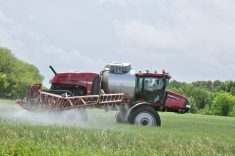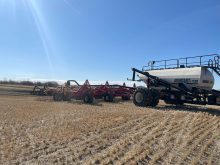Agriculture and Agri-Food Canada (AAFC) will get steady funding for wheat and barley breeding over the next five years through the Western Grains Research Foundation (WGRF).
The WGRF is investing $21.4 million — $20 million and $1.4 million for wheat and barley, respectively, up until 2020, it said in a news release Feb. 8.
The money comes from the Prairie-wide farmer checkoffs on wheat and barley, which will end July 31, 2017, to be replaced by provincially based levies.
“We have enough of a reserve built up in the wheat and barley checkoffs to provide core funding for five years to Ag Canada that we announced today,” WGRF executive director Garth Patterson said in an interview. “We hope in the next week or two to have announcements at the three western Canadian universities that we’re also funding. Our goal is to create stability in the public wheat- and barley-breeding system out to 2020. That will provide a cushion from when the western Canadian deduction ends in July next year.”
Read Also

CUSMA access key among other trade noise: Seeds Canada panel
Seeds Canada conference panelists say Canada needs to stay focused and wait as U.S. trade and tariff chaos develops, and a Canada-U.S.-Mexico Agreement review looms
The funding has the full support of the wheat and barley associations and commissions in Western Canada, he added.
“It gives them time to get their plans in place to assume responsibility (to fund plant breeding),” Patterson said. “That’s the intent — so there’s no cliff. Nobody has to worry about support for public research after July 31, 2017 when the western checkoff ends.
“The whole key here is stability in public wheat and barley breeding.”
The WGRF, established in 1994 through an endowment fund created from money left in a defunct farm support program, will continue to support public research on western crops after its current checkoff ends, Patterson said. The $120-million fund currently earns four to five per cent a year allowing the farmer-run WGRF to invest $7 million to $8 million annually,without depleting the fund, he said.
“Checkoff investments of over $90 million since 1994 have resulted in the development of 120 wheat and barley varieties,” WGRF vice-chair Keith Degenhardt, said in a release. “Varieties like Lillian, Strongfield, Carberry, and Unity VB have offered not only higher yields but improved end-use properties, and better disease and insect resistance compared to those previously grown in farmers’ fields.”
WGRF funding will also be used to fight potentially devastating wheat and barley diseases, such as fusarium head blight, enhance insect resistance, combat environmental stresses such as drought and flooding and develop genetic markers for plant-breeding selection.
“Wheat and barley contribute billions of dollars annually to Canada’s economy,” Agriculture Minister Lawrence MacAulay said in a release. “This substantial investment in wheat and barley variety development will advance innovation, giving Canadian grain farmers a competitive edge to meet world demands for food and feed.”



















